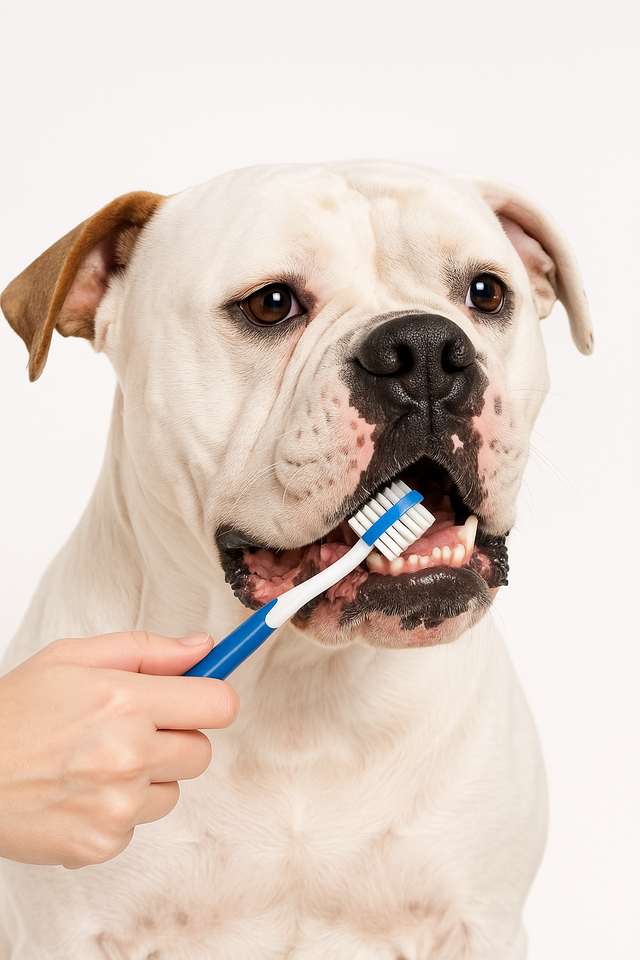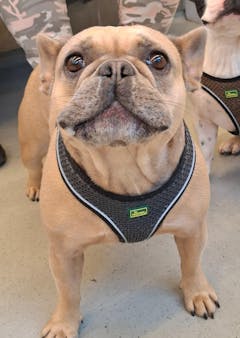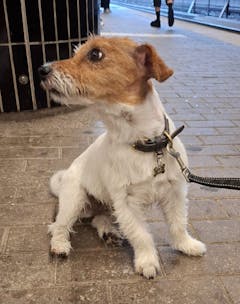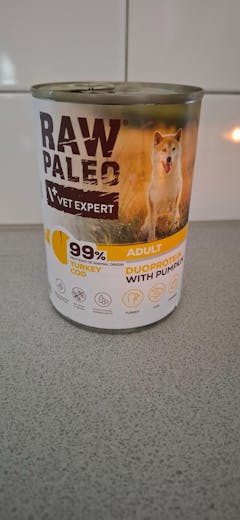
Munvård

Munvård för Hund: En Oumbärlig Del av Din Hunds Hälsa och Välbefinnande
På ZooStar.se är vi övertygade om att en frisk mun är en förutsättning för en frisk hund. Precis som för oss människor, spelar god **munvård för hund** en avgörande roll för hundens totala hälsa och livskvalitet. Tyvärr är tand- och munproblem bland de vanligaste åkommorna hos hundar, ofta oupptäckta tills de orsakar smärta, infektioner och allvarliga hälsoproblem. Dålig andedräkt är ofta det första tecknet på att något inte står rätt till, men det är bara toppen av isberget. Utan regelbunden **tandvård** kan plack utvecklas till tandsten, vilket kan leda till tandköttsinflammation (gingivit), tandlossning (parodontit) och i värsta fall spridas till vitala organ som hjärta och njurar.
I denna omfattande guide kommer vi att utforska vikten av **munvård**, hur tandproblem uppstår, vilka tecken du ska vara uppmärksam på, och framför allt – hur du aktivt kan arbeta för att förebygga dem. På Zoostar.se hittar du ett noga utvalt sortiment av produkter för att du ska kunna ge din hund den bästa möjliga **munvård**en, från tandborstar och tandkräm till tuggben och specialtillskott. Låt oss tillsammans ge din hund ett friskt leende och ett långt, smärtfritt liv!
Varför är God Munvård så Avgörande för Hundar?
Munnen är inkörsporten till resten av kroppen. När munhälsan försämras, påverkas inte bara tänderna och tandköttet lokalt, utan hela hundens system kan drabbas. Här är de främsta anledningarna till varför **munvård** är så viktig:
- Förebyggande av Smärta: Tandsten, karies och tandköttsinflammation är smärtsamma tillstånd. Hundar är mästare på att dölja smärta, så problem kan ha pågått länge innan du märker det.
- Förhindra Infektioner: Bakterier från munhålan kan ta sig in i blodbanan och sprida sig till hjärta, njurar, lever och andra organ, vilket kan leda till allvarliga infektioner och sjukdomar.
- Bevara Tänderna: Progressiv tandlossning leder till att tänder måste dras ut, vilket kan påverka hundens förmåga att äta och tugga normalt.
- Eliminera Dålig Andedräkt: Dålig andedräkt (halitosis) är ett vanligt tecken på bakterietillväxt i munnen och kan vara mycket besvärande för både hund och ägare.
- Ökad Livskvalitet: En smärtfri och frisk mun bidrar till att hunden kan äta, leka och interagera obehindrat, vilket leder till ett gladare och mer aktivt liv.
Enligt statistik lider majoriteten av hundar över tre års ålder av någon form av tandsjukdom. Detta understryker vikten av proaktiv **munvård** från tidig ålder.
Hur Uppstår Tandproblem hos Hundar?
Tandproblem hos hundar börjar oftast med plack, som sedan utvecklas till tandsten.
- Plackbildning: Efter varje måltid bildas en osynlig film av bakterier, saliv och matrester på tandytan. Detta kallas plack.
- Tandsten: Om placken inte avlägsnas, mineraliseras den av saliven och hårdnar till tandsten. Tandsten är hård och gul-brun och kan inte borstas bort med vanlig tandborstning.
- Tandköttsinflammation (Gingivit): Tandstenen irriterar tandköttet, vilket leder till rodnad, svullnad och blödning i tandköttet. Detta stadium är reversibelt med professionell rengöring och god hemvård.
- Tandlossning (Parodontit): Om tandköttsinflammationen inte behandlas, sprids inflammationen ner under tandköttskanten och påverkar käkbenet och ligamenten som håller tanden på plats. Detta leder till att tänderna blir lösa och i slutändan faller ut. Parodontit är irreversibelt.
- Andra Komplikationer: I avancerade fall kan bakterier sprida sig från munnen till hundens blodsystem och orsaka skador på inre organ, såsom hjärta, njurar och lever. Tandabscesser är också en vanlig och smärtsam komplikation.
Tecken på Tandproblem hos Din Hund:
- Dålig andedräkt: Det vanligaste och mest uppenbara tecknet.
- Synlig tandsten: Gul-bruna beläggningar på tänderna, särskilt vid tandköttskanten.
- Rött, svullet eller blödande tandkött: Tecken på inflammation.
- Minskad aptit eller svårigheter att äta: Hunden kanske tvekar att tugga, tuggar bara på ena sidan, eller tappar mat.
- Ökad salivering: Kan vara ett tecken på smärta eller obehag.
- Vädjar om uppmärksamhet vid munnen: Hunden kanske gnuggar ansiktet, tassar mot munnen eller blir irriterad när du försöker röra munnen.
- Förändrat beteende: Trötthet, irritabilitet, eller att hunden drar sig undan.
- Lösa eller saknade tänder.
Om du upptäcker något av dessa tecken, kontakta din veterinär för en professionell bedömning och eventuell åtgärd.
Zoostars Produkter för Effektiv Munvård för Hundar
På Zoostar.se har vi samlat ett brett sortiment av produkter för att du ska kunna erbjuda din hund en omfattande och förebyggande **munvård**. Regelbunden hemvård är den absolut viktigaste faktorn för att bibehålla en god munhälsa.
1. Tandborstning: Guldstandarden för Hundens Tänder
**Tandborstning hund** är den mest effektiva metoden för att avlägsna plack och förebygga tandsten. Målet är att borsta tänderna dagligen, men även några gånger i veckan gör stor skillnad. Börja träna din hund redan som valp för att vänja den vid processen.
- Hundtandborstar: Finns i olika utföranden; fingertandborstar för att vänja valpar och unga hundar, vanliga tandborstar med vinklat huvud och mjuka borst, eller elektriska tandborstar för mer effektiv rengöring.
- Hundtandkräm: Speciellt framtagen för hundar. De innehåller inga skadliga ämnen som fluor och finns i smaker som hundar gillar (t.ex. kyckling, köttsmak). Tandkräm med enzymer kan dessutom hjälpa till att bryta ner plack och motverka bakterier.
Borsta med små cirkulära rörelser, fokusera på tandköttskanten där plack samlas. Kom ihåg att lyfta läppen för att komma åt alla tänder, särskilt kindtänderna.
2. Tandvårdsben & Tugg: Naturligt Slitage och Fräsch Andedräkt
**Tuggben tandvård** och andra tuggprodukter kan vara ett utmärkt komplement till tandborstningen. De hjälper till att skrapa bort plack mekaniskt och kan stimulera salivproduktionen, som bidrar till att skölja bort bakterier. Välj tugg som är anpassade efter din hunds storlek och tuggkraft.
- Speciella tandvårdsben: Utformade med en struktur som mekaniskt rengör tänderna när hunden tuggar.
- Råhudsben eller naturliga tugg: Hårdare tugg som ger långvarig tuggtid och bidrar till rengöring.
- Frysta morötter eller äpplen: Kan fungera som ett naturligt tugg för att bidra till tandrengöring.
Det är viktigt att notera att tuggben aldrig kan ersätta regelbunden tandborstning eller professionell rengöring vid behov.
3. Munvatten & Plackreducerande Vätskor: För Enklare Vardag
För hundar som inte accepterar tandborstning lika väl, eller som ett extra komplement, finns **munvatten hund** och tillsatser för dricksvattnet. Dessa produkter innehåller ofta enzymer eller andra aktiva substanser som hjälper till att minska bakterietillväxten och plackbildningen i munnen.
- Munvatten/vattenadditiv: Tillsätts i hundens dricksvatten och arbetar systematiskt för att minska bakterier och fräscha upp andedräkten.
- Munsprayer: Kan sprayas direkt i hundens mun för att ge en snabb uppfräschning och bidra till att motverka plack.
- Tandvårdsservetter: Praktiska för att snabbt torka av tändernas yta.
4. Kosttillskott för Munhälsa: Stöd Inifrån
Vissa **kosttillskott** kan bidra till att förbättra munhälsan inifrån, ofta genom att påverka salivens sammansättning eller minska plackbildningen.
- Alger (t.ex. Ascophyllum Nodosum): Vissa algprodukter har visat sig kunna minska bildningen av tandsten genom att påverka salivens förmåga att fästa mineraler på tänderna.
- Probiotika: Specifika probiotiska stammar kan bidra till en hälsosam bakteriebalans i munhålan, vilket kan motverka de bakterier som orsakar dålig andedräkt och plack.
Dessa tillskott hittar du i vår kategori Kosttillskott & Hälsa.
Steg-för-Steg Guide till Hemmatandvård för Din Hund
Att etablera en rutin för **munvård** kräver tålamod och positiv förstärkning, men det är väl värt ansträngningen.
- Börja tidigt: Ju tidigare du börjar, desto lättare är det att vänja hunden. Börja med att bara röra vid hundens mun och lyfta läpparna. Beröm och belöna.
- Vänj vid beröring: Använd din hand eller ett finger med lite tandkräm på för att vänja hunden vid känslan i munnen.
- Inför tandborsten: När hunden är bekväm med ditt finger, introducera fingertandborsten eller en mjuk hundtandborste med lite tandkräm.
- Korta pass: Börja med korta pass, bara några sekunder i taget, och öka gradvis längden.
- Fokusera på utsidan: Borsta tändernas utsidor, särskilt bakre kindtänderna där plack oftast ansamlas. Insidan rengörs oftast naturligt av tungan.
- Positiv förstärkning: Belöna alltid med beröm, lek eller en favoritgodbit direkt efter varje pass, oavsett hur kort det var. Detta skapar en positiv association med **tandborstning hund**.
- Regelbundenhet: Försök att borsta dagligen. Även varannan dag är mycket bättre än ingen alls.
- Veterinärkontroller: Utöver hemvård är regelbundna veterinärkontroller avgörande. Veterinären kan upptäcka problem i tid och rekommendera professionell tandrengöring vid behov.
Munvård i Relation till Hundens Övriga Hälsa på Zoostar.se
En god **munvård** är en grundläggande byggsten för hundens totala välbefinnande. På Zoostar.se strävar vi efter att erbjuda en helhetslösning för din hunds hälsa, där alla kategorier samverkar för optimal effekt:
- Hundens Apotek: Vår centrala kategori för all hundhälsa. **Munvård** är en vital del av detta apotek, då obehandlade tandproblem kan påverka hela kroppen.
- Parasitskydd & Insektsskydd: En frisk hund är mer motståndskraftig mot parasiter. Även om det inte är en direkt koppling, bidrar god allmänhälsa till hundens förmåga att hantera externa hot.
- Kosttillskott & Hälsa: Här hittar du specifika tillskott som kan stödja munhälsan, exempelvis alger mot tandsten eller probiotika för en balanserad munflora.
- Vård & Skydd: En frisk mun minskar risken för att bakterier sprids till sår eller andra kroppsdelar, vilket är viktigt för allmän vård och skydd.
- Hundvård & Hygien: Daglig hygien och omvårdnad, inklusive **munvård**, bidrar till att tidigt upptäcka problem och upprätthålla en ren och frisk hund.
Genom att integrera regelbunden **munvård** i din hunds dagliga rutin, kompletterat med produkter från Zoostars breda sortiment, investerar du i ett långt, friskt och lyckligt liv för din bästa vän. Besök Zoostar.se idag och ta steget mot en optimal munhälsa för din hund!
Vanliga Frågor om Munvård för Hund (FAQ)
Varför är min hunds andedräkt så dålig?
Dålig andedräkt hos hundar (halitosis) är nästan alltid ett tecken på underliggande munproblem, oftast plack och tandsten. Bakterier som frodas på tandstenen avger svavelhaltiga föreningar som luktar illa. Andra orsaker kan vara tandköttsinflammation, karies, infektioner i munhålan eller, i mer sällsynta fall, problem med njurar, lever eller diabetes. Det är viktigt att undersöka orsaken hos veterinär för att utesluta allvarligare hälsoproblem.
Hur ofta ska jag borsta min hunds tänder?
Idealet är att borsta din hunds tänder **dagligen**. Daglig borstning är den mest effektiva metoden för att avlägsna plack innan den hinner mineraliseras till tandsten. Om daglig borstning inte är möjlig, gör stor skillnad att borsta varannan eller var tredje dag. Det är viktigare med regelbundenhet än att borsta intensivt och sällan.
Kan tuggben verkligen rengöra min hunds tänder?
Tuggben, särskilt de som är speciellt framtagna för tandvård, kan bidra till att minska plack och tandsten genom mekaniskt slitage när hunden tuggar. Vissa tuggben innehåller även enzymer eller andra ämnen som kan motverka plack. De är ett **utmärkt komplement** till tandborstning, men kan inte ersätta den helt. För bästa effekt bör du kombinera tuggben med daglig borstning.
Är det farligt att ge min hund människotandkräm?
Ja, det är farligt och du bör **aldrig** använda människotandkräm på din hund. Människotandkräm innehåller ofta fluor, xylitol (ett sötningsmedel som är mycket giftigt för hundar) och andra ingredienser som kan vara skadliga om de sväljs av hunden. Använd alltid en tandkräm som är speciellt framtagen för hundar, då dessa är säkra att svälja och kommer i smaker som hundar gillar.
Min hund har redan tandsten, kan jag borsta bort den?
Nej, när placken har mineraliserats till **tandsten** är den för hård för att borstas bort med en vanlig tandborste. Tandsten måste avlägsnas professionellt av en veterinär, oftast under narkos, med hjälp av speciella instrument. Regelbunden tandborstning kan dock förhindra att ny tandsten bildas efter en rengöring och kan sakta ner uppbyggnaden av plack som annars skulle bli tandsten.
Hur vänjer jag min hund vid tandborstning om den är ovillig?
Börja långsamt och ha tålamod. Börja med att bara röra vid hundens nos och läppar under korta stunder, och belöna. Gå sedan över till att gnugga med ditt finger mot tänderna, med eller utan lite hundtandkräm. Introducera gradvis en fingertandborste och sedan en vanlig hundtandborste. Håll passen korta och positiva, och avsluta alltid med beröm och belöning. Ge aldrig upp, även små framsteg är viktiga.
Vad kostar en professionell tandrengöring hos veterinären?
Kostnaden för en professionell tandrengöring varierar beroende på var du bor, klinik, hundens storlek, hur mycket tandsten som behöver avlägsnas, och om tänder behöver dras ut. Det är ofta en relativt kostsam procedur då den involverar narkos, tandröntgen och specialutrustning. Regelbunden hemvård kan minska behovet av täta professionella rengöringar och därmed spara dig pengar på lång sikt.
Husdjursprodukter Online
Utforska fler populära hundkategorier
Här hittar du många av våra mest efterfrågade kategorier – från hundfoder och godis till tillbehör, vård och aktivering.
Ledande Fodertillverkare
Populära hundfodermärken
Här hittar du våra mest populära hundfoder – från spannmålsfritt till veterinärfoder. Klicka på ett varumärke för att se hela sortimentet.






